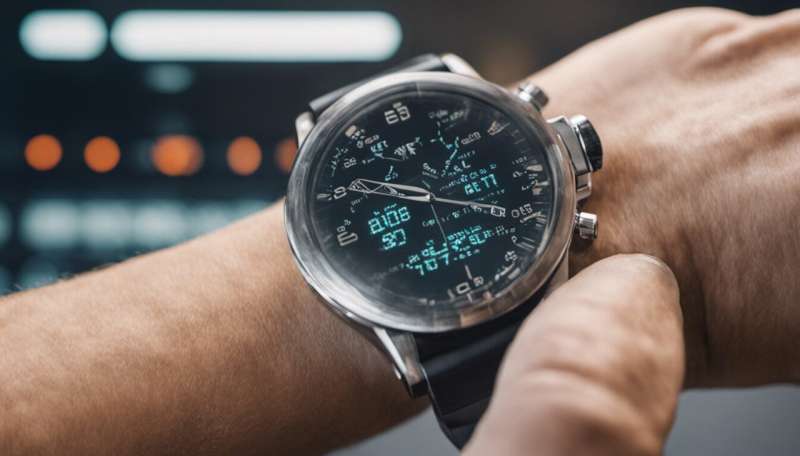This article has been reviewed according to Science X's editorial process and policies. Editors have highlighted the following attributes while ensuring the content's credibility:
fact-checked
trusted source
proofread
Wearable sensors provide early detection of progression in Parkinson's disease

A team of researchers from the University of Oxford has shown for the first time that it is possible to track the progression of Parkinson's disease accurately using specially trained machine learning algorithms to analyze data derived from sensor devices worn by patients.
The novel methods described in this study led by Professor Chrystalina Antoniades in Oxford's Nuffield Department of Clinical Neurosciences can be used by clinicians alongside the more traditional clinical rating scales to not only improve the accuracy of diagnosis, but also track progression of Parkinson's disease. "Identification of motor progression in Parkinson's disease using wearable sensors and machine learning" is published in npj Parkinson's Disease.
Professor Antoniades said, "Being able to monitor the progression of motor symptoms in people with neurological disorders such as Parkinson's disease is important for two main reasons: clinicians need to be confident in their assessment of how the disease is progressing in individual patients, and researchers running clinical trials need to be able to measure how well therapeutic interventions are working.
"This is an important development for clinical trials. Bringing a new drug for a disease like Parkinson's from early development to clinical use takes years and consumes vast resources, and many drugs that look promising in the lab turn out not to work in patients. It is critical to be able to spot the ones that are effective as early as possible, so work on them may be accelerated. I hope this will be made easier with these new objective measuring tools.
"At the moment, clinicians use rating scales (scoring systems based on a physical examination) to assess the key symptoms of people with Parkinson's disease. One problem with this is that there is an element of subjectivity in the assessment and different clinicians may not provide identical scores. Another issue is that the scales are not evenly spaced—the difference between scores of 30 and 40 may not be the same as the difference between 40 and 50 for example. This means that the detection of disease progression could be delayed, and in clinical trials, the types of statistical analysis that can be performed on the data might be restricted."
Professor Antoniades' NeuroMetrology Lab have been carrying out experiments to assess whether sensor devices worn by patients on their trunk, wrists, and feet, combined with machine learning, can track the progression of motor symptoms more accurately than traditional rating scales.
They and others have previously demonstrated that the analysis of data from wearable devices using machine learning algorithms can help with accurate diagnosis. It is already known that these new techniques can be used to discriminate between healthy older adults, individuals with different severity of Parkinson's disease, and individuals with other Parkinsonian-like disorders.
In this new study, the researchers asked whether it was possible to use the data collected during walking and standing tasks not only to diagnose but also to track the progression of motor symptoms in Parkinson's disease over time. The study participants were assessed intensively with visits to the clinic every three months, in order that the team could determine the shortest time over which their analysis could detect disease progression. They found that progression could be detected in as little as 15 months with their technique.
More information: Charalampos Sotirakis et al, Identification of motor progression in Parkinson's disease using wearable sensors and machine learning, npj Parkinson's Disease (2023). DOI: 10.1038/s41531-023-00581-2



















